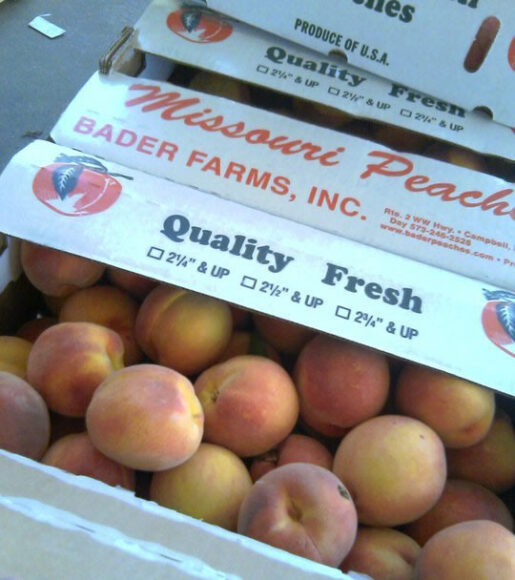A federal appellate court on Thursday upheld a $15 million damage award to a Missouri peach farmer whose crops were damaged by pesticides that drifted off of nearby fields, but overturned a $60 million punitive damage award and ordered a new trial on that point alone.
Business groups had urged the 8th Circuit Court of Appeals to reject what they called a “novel theory of liability,” which blamed Monsanto Co. and BASF Corp. for developing a herbicide-resistant cotton and soybean seeds that encouraged farmers to spray herbicides onto their crops during growing season despite labels warning against such use.
The appellate panel ruled that the evidence shows that Monsanto and BASF engaged in a conspiracy to enable off-label use of dicamba, a pesticide that kills most crops if applied during growing season.
However, the panel also found that the trial court erred by allowing a jury to hold Monsanto and BASF jointly liable for punitive damages because the plaintiffs did not prove the two companies were equal partners in a joint venture. While the two companies did work together, Monsanto had greater control over how the pesticides were used, the panel held.
“The evidence here ‘established different degrees of culpability’ between the co-conspirators,” the panel’s opinion says, citing a previous decision.
Monsanto has been a frequent target for plaintiffs’ attorneys. Litigation over its Roundup weedkiller product has dragged on for years and resulted in both wins and losses for the company. Monsanto, owned by Bayer AG, says it has earmarked $6 billion for Roundup litigation costs.
Bader Farms sued Monsanto and BASF after its peach orchards were damaged by dicamba. Bader submitted financial records showing that the peach crop produced annual revenues of $2,285,354. An expert testified that Bader Farms had lost $20.9 million in profits because of exposure to pesticides.
Bader blamed both Monsanto and BASF for the losses because the two companies had worked together to create a “system” that included a herbicide-resistant cotton seed, called Xtend, that they initially planned to use in conjunction with a new, less volatile form of dicamba herbicide what would be less likely to drift off property when sprayed onto crops.
Monsanto decided to start selling Xtend seeds in 2015 even though the companies had not yet developed the less volatile form of dicamba. Monsanto affixed a pink label to each bag of Xtend seeds it sold, warning farmers not to spray dicamba during growing season.
Even so, off-label dicamba use exploded, according to the court decision. By July 2016, 115 complaints of off-target “dicamba drift” were reported in Missouri’s bootheel region, where Bader Farms grows peaches.
The Environmental Protection Agency did not approve lower-volatility dicamba herbicide until November 2016.
Bader Farms’ lawsuit charged that Monsanto and BASF were negligent in the design of the Xtend product and failed to adequately warn users of the danger. A federal jury awarded Bader $15 million in compensatory damages and $250 million in punitive damages. A US District Court judge reduced the punitive damage award to $60 million.
Monsanto and BASF appealed. Business groups, including the US and Missouri Chambers of Commerce, filed amicus briefs urging the 8th Circuit to overturn the jury verdict. A brief submitted by attorney Mark A. Behrens says Bader Farms did not prove that dicamba manufactured by Monsanto caused harm to its peach crop.
“Plaintiff’s radical theory opens the door to nearly limitless liability for any manufacturer whose product could be used in conjunction with a third-party’s product,” the amicus brief says. “This approach could create absurd results.”
The appellate panel’s opinion says the plaintiffs presented ample evidence to support the award of compensatory damages. During a meeting before the launch of Xtend, the companies identified “off-label” use of dicamba as a risk.
The punitive damage award was another matter. The appellate panel said while Monsanto and BASF worked together to develop a “system” that was to include both the Xtend seed product and a less volatile version dicamba, they did not have equal control. Monsanto maintained full control over critical aspects of the project, the panel said.
The opinion says the jury should have been instructed to award punitive damages separately for each plaintiff.
The 8th Circuit vacated the punitive damage award and remanded the case for a new trial only on the issue of punitive damages.
“BASF is pleased the Appeals Court recognized that the punitive damages award focused on Monsanto’s conduct, and that BASF’s conduct must be considered separately from Monsanto’s in evaluating punitive damages,” BASF manager Chip Shilling said in an email. “BASF is further pleased to see the punitive damages award vacated altogether for a new trial.”
The Bader Farms lawsuit was one of more than 100 similar lawsuits over dicamba use, Reuters reported. Bayer announced in June 2020 that it would pay up to $400 million to settle the lawsuits, the news service said.
Was this article valuable?
Here are more articles you may enjoy.


 Navigators Can’t Parse ‘Additional Insured’ Policy Wording in Georgia Explosion Case
Navigators Can’t Parse ‘Additional Insured’ Policy Wording in Georgia Explosion Case  Hackers Hit Sensitive Targets in 37 Nations in Spying Plot
Hackers Hit Sensitive Targets in 37 Nations in Spying Plot  Portugal Rolls Out $2.9 Billion Aid as Deadly Flooding Spreads
Portugal Rolls Out $2.9 Billion Aid as Deadly Flooding Spreads  These Five Technologies Increase The Risk of Cyber Claims
These Five Technologies Increase The Risk of Cyber Claims 